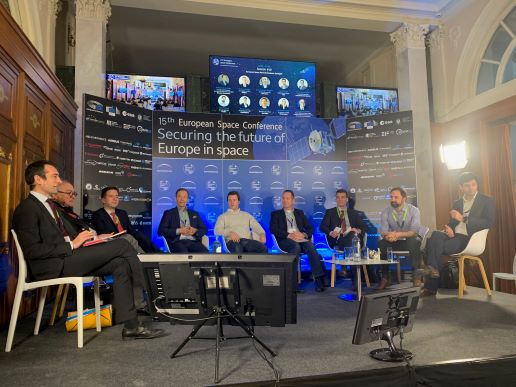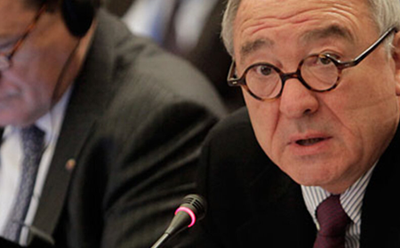|
Corporate Video |
|
|
| |
SUPPORTING PARTNERS
Young European Space Entrepreneur Focus |
|
|
 |
| EVENTS |
Featuring Young European
Space Entrepreneur
contactyesef@gmail.com
|
|
|

|
|
|
|
News / Development /
Innovation |
|
OQ Technology has been
successfully awarded € 1.1 Million a contract
for ERMIS mission.
OQ Technology has been
successfully awarded € 1.1 Million a contract to
design, build, integrate, test and demonstrate
three advanced nanosatellites featuring multiple
payloads providing space-based 5G narrowband
internet-of-things communications services, an
optical communications link, as well as
hyperspectral Earth observation data to support
precision agriculture as part of the ERMIS
mission. ERMIS [Hellenic Cubesat Demonstration
Mission] is a pathfinder demonstration of key
space connectivity capabilities linked to
Greece’s 200M€ national small satellite project
using a constellation of small satellites.
OQ Technology Hellas is a
subcontractor and a key member of the ERMIS
consortium led by the National and Kapodistrian
University of Athens (NKUA). Other members of
the consortium include the University of Patras,
the University of the Aegean and the National
Observatory of Athens.
ERMIS-1 and ERMIS-2
Cubesats built by OQ Hellas will host the
payloads of OQ Technology Luxembourg to
demonstrate 5G internet-of-things
non-terrestrial network (5G-IoT-NTN)
connectivity and additionally incorporate
Inter-Satellite Link (ISL) to enhance its
coverage.
The importance of 5G
technology in satellite IoT (Internet of Things)
lies in its ability to provide high-speed,
reliable, and low-latency connectivity to a wide
range of devices, including those in remote and
difficult-to-reach locations. In satellite IoT,
5G technology enables the integration of
satellite networks with terrestrial networks,
creating a seamless and unified network that can
support a wide range of applications, including
smart agriculture, pipeline monitoring,
transportation tracking, and much more.
Moreover, 5G technology enables satellite IoT
devices to operate in challenging environments,
such as harsh weather conditions, remote
locations, or disaster areas, where traditional
communication networks may not be available.
Demonstrating and testing
ISL for 5G IoT NTN will enable OQ Technology to
offer enhanced coverage and faster speeds in
delivering data to its customers reliably and
seamlessly. The two satellites will join OQ
Technology global growing satellite fleet of 5G
NB-IoT. The technology is based on 3GPP Release
17 standardized 5G connectivity.
ERMIS-3 co-built by OQ
Hellas with NKUA will host payloads from the
other members of the consortium to demonstrate
optical communications link and hyperspectral
Earth Observation data to support precision
agriculture.
Mr. Vaios Lappas,
Department Head, Aerospace Science & Technology,
University of Athens, and the technical officer
of the Prime Contractor quoted that ‘We are very
pleased that Greece’s first small satellite
constellation will be using game changing
technologies in telecommunications, IoT/5G,
hyperspectral imaging. A key and important
aspect of our project is the cooperative nature
of academia and industry leaders such as OQ.
Working with a world innovator such as OQ will
push national and European leadership in 5G/IoT
and foster growth, new jobs and unique space
applications which come with the use of 5G/IoT.’
Figure 2: ERMIS Team with
ESA experts at the Greek CubeSat Projects
Workshop
The initiative underpins
efforts – led by ESA on behalf of the Greek
Ministry of Digital Governance – to expand the
nascent space industry in Greece, enabling the
digital transformation of society while creating
jobs and generating prosperity, as part of the
nation’s EU-funded Recovery and Resilience
Facility. The ERMIS 4.8M€ project is funded by
the European Union – NextGenerationEU and by the
Greek Ministry of Digital Governance.
Mr. Frédéric Rouesnel,
Greek National Telecom Satellite Project Mission
Project Manager recalled that "On 26 November
2021, the ministry of Digital Governance in
Greece implemented an agile path to materialize
the Greek National Satellite Project aiming to
enhance the capabilities of
Greek Small & Medium Enterprises (SMEs) in
satellite technologies and applications,
especially for communications and Earth
Observation, and to empower the country to build
the necessary expertise for satellite systems
design and implementation locally. OQ
Technology, already a front runner in Satellite
5G-IoT domain, through the ERMIS mission is well
aligned with this vision, ambition, challenge
and is well positioned to be the commercial and
technology driver for building capabilities for
satellite technologies locally in Greece while
at the same time delivering state of the art
satellite based 5G-IoT connectivity globally.”
Mr. Omar Qaise, Founder &
CEO of OQ Technology Group
added that “OQ Technology group companies are
collaborating together on an European but also
global level to leverage the capabilities and
opportunities in these markets but also build
new partnerships and skills - We work with
global satellite manufacturers, nevertheless to
accelerate our satellite 5G constellation
deployment it is essential also to have the
capability to deploy the ERMIS platforms
carrying 5G NB-IoT payloads in the near future –
We are very grateful to the European Space
Agency (ESA) for granting our consortium the
ERMIS opportunity, we are thankful to our
trusted Greek consortium partners who made this
proposal a success and we look forward to
working together to bring ERMIS satellites to
orbit soon.”
|
|
EDITO
: Juan Tomás Hernani,
President of YEESS |
|
YEESS: The new “space virtual enterprise, larger
than any other space enterprise in Europe, who
did not exist 5 years ago”

Space is
not a big place, neither our planet Earth. It
looks an oxymoron, but the reality shows that
the Low Earth Orbits are now considerably
crowded, having grown from 1500 to over 8200
(UNOOSA, Jan22), out of which nearly a half
belong to a single US constellation, Starlink.
That is
why the European Commission and ESA decided to
launch the IRIS2
constellation,
an attempt to reserve the sovereignty and voice
of Europe into the game, going beyond secure
communications and including Earth Observation
and GNSS as additional fundamental services that
will differentiate the EU operation.
Since
the Lisbon 2000 objective (3% devoted to R+D+i),
Europe keeps repeating itself its strengths in
research capacities (now 3rd in the
world after China and US), and its weaknesses in
technology transfer (TT), with poorer results in
entrepreneurship. Mazzucato (“The
entrepreneurial State”) proposes to change this
perspective of poor TT into the analysis of the
industrial infrastructure, its behaviour, its
readiness to invest in technology as well as the
purchase policies and practices of the public
institutions.
Recently
ESA has awarded 9 Copernicus Contributing
Missions that soon will be disclosed, showing a
new attitude towards the opportunity, pointing
at new players with high potential.
And The
European Commission has dictated the rule of 30%
SME content in the aforementioned IRIS2
open competition.
But is
this willingness to push the European Space SMEs
corresponding to an industrial reality?
Otherwise, it could be a lost effort.
In a
truly bottom-up, continuous and open process,
the most promising European Space SMEs have
grown the Young European Enterprises Syndicate
for Space, YEESS. If we imagined this perimeter
of activities as a single virtual company, we
could show the leadership of YEESS in a robust
set of technologies and services like space
deployers, rockets, motors, thrusters, antennas,
RFI, optical cameras, EO full solutions or
launch services, amongst others. They are
provided by companies that successfully sell
those technologies outside Europe. This
catalogue can hardly be found outside YEESS,
especially with the dominant focus into small
satellites.
Furthermore, the majority of our members are
Gazelle companies (as defined by Eurostat), who
have arrived at over 900 jobs, mainly highly
skilled engineers, that did not exist 5 years
ago, who exist based on new private investments
and who take growth as a strong commitment with
all stakeholders. This segment represents the
vast majority of the growth and new employment
of the space sector.
Not many
other initiatives, from various economy sectors,
can provide this given to new generations in
Europe. Our common destiny, through various
countries in Europe, is also a destiny of
employment, technology, space challenges and
adventure.
But this
initiative requires continuous attention, care
and intelligence, in other to have an
international consolidation that keeps the
aggressive growth rate.
Soon
YEESS will provide its publication from its
observatory of business data, offering those
evidences as a best practice for companies and
institutions.
And
therefore, the initiatives like Copernicus
Contributing Missions or IRIS2
are a must that
makes YEESS sustainable. Thank you for these
bold steps.
Juan Tomás Hernani
President of YEESS
The
YEESS syndicate is an alliance of young European
space entreprises at the service of Europe.
YEESS entreprises are agile and available to
reinvent our
transportation on Earth and to Moon and Mars.
|
|
|
|
EDITO
of Mr Jean-Jacques Dordain |
|
New space
is not new, but continues to be new every day,
with a momentum fed by the convergence between a
growing demand for data, a decrease of costs and
an increasing role of software in the value
chain.
New actors
are entering space based businesses by the day,
generating neo dreams and new realities,
sustaining a momentum of changes in the entire
space sector, young enterprises and legacy
companies, private investors and public
institutions. These changes are not proper to
space, but space contributes more and more all
changes which affect our lives, for the good or
for the bad.
However, in
these changes, the image is different from the
reality; lobbyists, commentators, promoters
provide an image driven by their objectives
rather than by the facts. In particular, Europe
looks brighter and more successful from outside
Europe than from Europe.
The
lobbyists are more on the side of legacy
companies and the commentators look more
interested in weaknesses and failures than by
strenghts and successes.
This is the
reason why, I more than welcome the creation of
the new platform, Young European Space
Entrepreneur Focus, which will give
the floor to young European entrepreneurs who
will give directly their views about the global
picture and how they change that picture.
In order to
support this new platform, I shall sustain my
connections with as many young European
entrepreneurs as possible. They all bring a wind
of change which will put Europe one step higher
in space.
Mr. Jean-Jacques
Dordain
Former
Director General of the European Space Agency
(2003-2015)
Member of
the Advisory Board of the Government of
Luxembourg on Space Resources

|
|
|
|
|
|
About: Young European Space Entrepreneur Focus |
|
|
YESEF, as its name indicates will be
a Focus that enables executives in space
business to quickly find information on main young enterprises with their synthetic
news. Our Focus will look at companies between 2
and 7 years old and of course we shall select
the most active and innovative ones with
interviews, quotes, and company announcements.
The Newspace movement is extremely active
in Europe and throughout the world. Every day a dozen new
enterprises are created in Europe and engage in a marathon race
to become one day, perhaps a world leader.
Disruptive technologies, dramatic shifts in
business models and value chains, the emergence of start-ups and
a substantial injection of private and public funds are
catalysing the sector’s fast development.
We have created this Space
Entrepreneur Focus platform in order to give a voice to young
European entrepreneurs, to hear and understand their vision and
to offer visibility and networking.
The two
founders and actors of the Focus platform are :
Kevin French,
publisher talk Satellite
Jacques Denavaut,
former communications senior VP of Arianespace and now
Founder and President of communications-smart Unip Lda.
|
|
|
|
|
|
|
|
.png)

